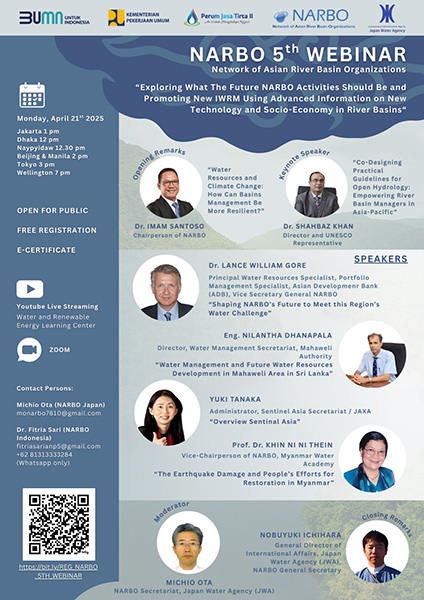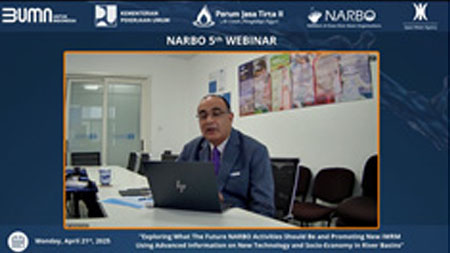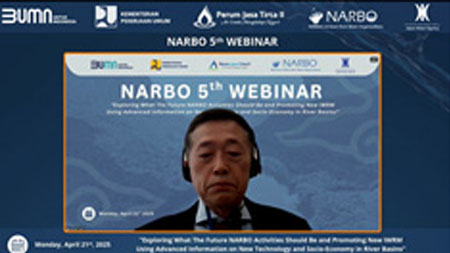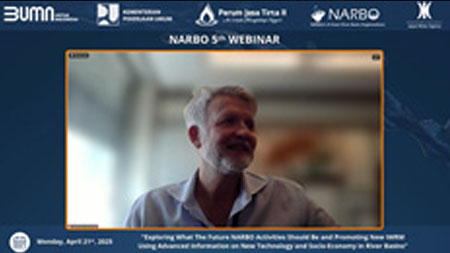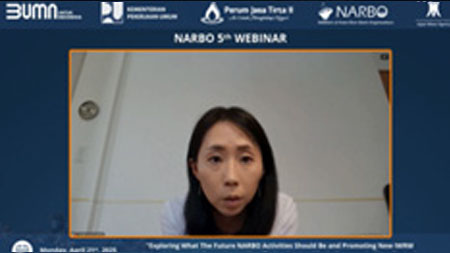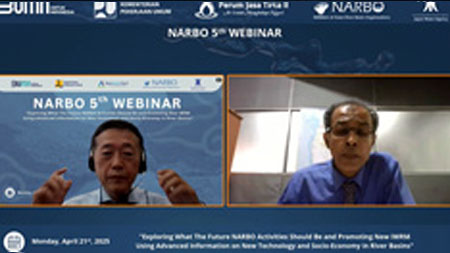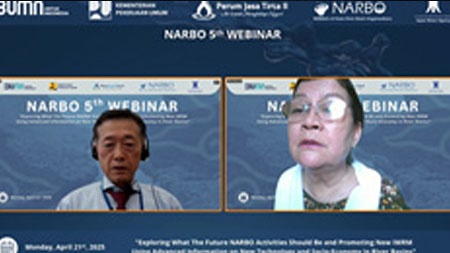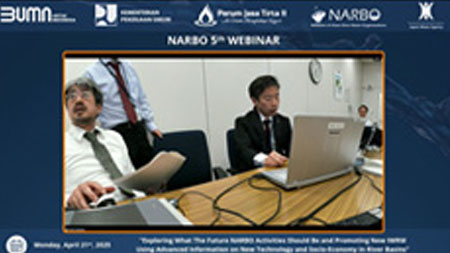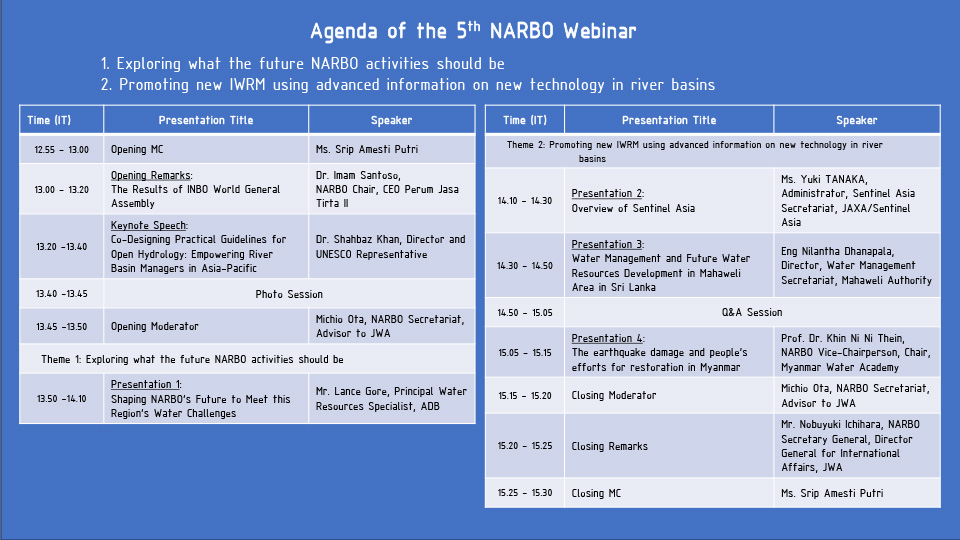
The 5th NARBO Webinar was successfully held on April 21, 2025, from 1:00 PM to 3:20 PM (JST), bringing together key stakeholders and expert in water resources management from across the Asia-Pacific region. The Webinar began with opening facilitation by Ms. Srip Amesti Putri from the NARBO Secretariat, who welcomed participants and introduced the objectives of the webinar.
At the beginning of the event, Dr. Imam Santoso, Chair of NARBO and President Director of Perum Jasa Tirta II, first presented the outcomes of the INBO World General Assembly, followed by a detailed explanation of NARBO's recent activities. Finally, in his opening remarks, he expressed his sincere appreciation to the distinguished speakers and called upon all webinar participants to actively engage in meaningful discussions, share their valuable insights, and contribute to the advancement of sustainable and resilient water resources management.
The keynote address was delivered by Dr. Shahbaz Khan, Director and UNESCO Representative, under the title “Co-Designing Practical Guidelines for Open Hydrology: Empowering River Basin Managers in Asia-Pacific.” He explained the importance of IWRM in the face of climate change, urbanization, and growing water demand in the Asia-Pacific region. Then explained that UNESCO's International Hydrological Programme (IHP) focuses on promoting sustainable water resource management through research, capacity development, and policy support. IHP emphasizes Open Hydrology, applying Open Science principles to ensure FAIR (Findable, Accessible, Interoperable, Reusable) data for better decision-making. He also mentioned the use of tools like CRIDA to address uncertainties in water management and the promotion of data openness based on the FAIR and CARE principles. While challenges remain in adopting Open Science in hydrology, such as limited incentives for researchers, he stressed the urgency of addressing climate change impacts, such as accelerated glacier melt, and emphasized the need for continued efforts to tackle these issues.
Mr. Michio Ota, from the NARBO Secretariat and Senior Specialist for Water Resources Engineering as well as Advisor at the International Affairs Division, Management and Planning Department of the Japan Water Agency (JWA), stated that this webinar had two main themes. He explained that Dr. Imam Santoso's presentation is related to the first objective, while Dr. Shahbaz Khan's presentation corresponds to the second one. He also mentioned that the presentations by the four invited speakers are each connected to these themes, and added that Prof. Dr. Khin Ni Ni Thein would deliver a special presentation on the recent earthquake that occurred in Myanmar. After explaining the changes in the webinar agenda, he handed the floor over to Mr. Lance Gore.
Mr. Lance Gore, Principal Water Resources Specialist at ADB, presented “Shaping NARBO's Future to Meet this Region's Water Challenges”. He provided a supplementary explanation regarding NARBO’s future direction and initiatives, as previously mentioned by Dr. Imam Santoso in his speech. He noted that as NARBO marks its 20th anniversary, the environmental context and challenges facing the Asia-Pacific region continue to evolve, and the NARBO must now address issues that did not exist at the time of its founding and he said, calls for a reconsideration of NARBO’s structure and approach is needed. In this context, he affirmed that the Asian Development Bank (ADB) will continue to support NARBO. He also announced that NARBO will soon be recruiting for two new roles: a Water and Organizational Development Specialist and a Communications and Knowledge Development Specialist. He then went on to explain the purpose, responsibilities, and the upcoming recruitment schedule for these positions.
Ms. Yuki Tanaka from the Sentinel Asia Secretariat (JAXA/Sentinel Asia) shared an “Overview of Sentinel Asia”. She began by explaining that among the various disaster observation methods, satellite monitoring is the most suitable for safely and widely observing large areas. She mentioned how disaster observation from space contributes to disaster management. Then introduced two main types of observation methods: Optical satellite data and Radar satellite data, outlining the strengths and weaknesses of each. She also provided an overview of Sentinel Asia, an initiative involved in disaster management activities across the Asia-Pacific region. This initiative operates under four key concepts: PREPAREDNESS,RESPONSE,RECOVERY, and MITIGATION, and it is unique in that 126 member agencies participate as volunteers. She shared recent observations, including the impact of Typhoon YAGI that caused widespread damage in Southeast Asia, as well as earthquake and wind flood disaster data from Myanmar. Finally, she provided an overview of the Annual Meeting held last year, which included workshops on disaster management, and highlighted ongoing new initiatives. She concluded by encouraging participation as a member organization of Sentinel Asia.
Eng. Nilantha Dhanapala, Director of the Water Management Secretariat at the Mahaweli Authority in Sri Lanka, presented on “Water Management and Future Water Resources Development in Mahaweli Area in Sri Lanka”. He gave a presentation on the development plans in the Mahaweli River Basin in Sri Lanka. He began by explaining the current state of the existing water distribution system and noted that the ultimate goal of the development plan is to irrigate 44% of the country's land. He then provided an overview of Sri Lanka’s major dams and reservoirs, pointing out that the majority of stored water is used for irrigation. He also described the status of water distribution systems in the Mahaweli Basin and adjacent catchments. In this context, he introduced the Water Management Panel (WMP) and the Water Management Secretariat (WMS), outlining their structures and respective roles in managing the basin. He discussed water usage during Sri Lanka’s two unique rainy seasons, Maha and Yala, and stated that the country's water usage exceeds the average for the Asia region. In relation to the Seasonal Operation Plan, he explained that tools such as the Vista Decision Support System are used, along with a variety of data. He presented several data points, including rainfall patterns across different basins. He concluded the presentation by outlining future initiatives.
Prof. Dr. Khin Ni Ni Thein, NARBO Vice-Chairperson and Chair of the Myanmar Water Academy, delivered a presentation titled “The Earthquake Damage and People's Efforts for Restoration in Myanmar”. She began by providing a chronological overview of the damage caused by the major earthquake that struck Myanmar on March 28. She explained that even three weeks after the event, some of the severely affected areas still lack access to electricity, clean water, and sanitation. She also gave a geological explanation of how the disaster occurred. In response to the earthquake, she noted that people-to-people help and support—citizen-led assistance—had been mobilized. She then addressed the impact the earthquake had on Myanmar's water bodies and outlined future actions to be taken in response to these effects. As part of this, she explained the role that NARBO is expected to play going forward. She concluded her presentation by showing several videos and photos illustrating the extent of the damage.
The event concluded with closing remarks by Mr. Nobuyuki Ichihara, NARBO Secretary General and Director General for International Affairs of JWA. He began by expressing gratitude for the successful organization of the 5th NARBO webinar. He explained that the presentations by each speaker were highly meaningful and valuable, and also mentioned that there were over 300 participants, offering his thanks once again to all attendees. He noted that nearly 20 years have passed since the establishment of NARBO, during which some countries have economically developed. However, he also emphasized that the importance of water has been growing due to the recent impacts of climate change. After reiterating the two main themes of the webinar, he summarized the content of the presentations by the speakers. When mentioning Prof. Dr. Khin Ni Ni Thein's presentation, he expressed condolences for the many precious lives lost in Myanmar due to the recent disaster.
